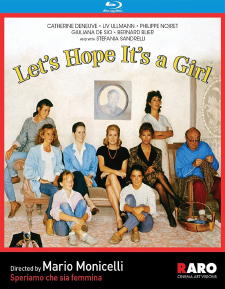Let’s Hope It’s a Girl (Blu-ray Review)

Director
Mario MonicelliRelease Date(s)
1986 (February 14, 2023)Studio(s)
Compagnia di Distribuzione Europea (Raro Video/Kino Lorber)- Film/Program Grade: B-
- Video Grade: B+
- Audio Grade: B+
- Extras Grade: F
Review
A very mild though not unpleasant Italian comedy-drama, Let’s Hope It’s a Girl (Speriami che sia femmina) comes to Blu-ray via RaroVideo. The film was an Italian-French co-production, resulting in much awkward casting. Such multi-national productions are commonplace in Europe, with Italian stars appearing in French films and vice versa, and sometimes this works out just fine. Many American viewers, for instance, aren’t even aware that the two stars of celebrated Italian film Cinema Paradiso, Philippe Noiret (as projectionist Alfredo) and the late Jacques Perrin (as the adult Salvatore), were French and their voices dubbed into Italian.
In Let’s Hope It’s a Girl, however, things get a little out of hand. It’s hard to accept Norwegian-born Swedish actor (and later director) Liv Ullmann in the central role of an Italian matriarch. Or that the three other major parts are played by French actors Philippe Noiret (again), Bernard Blier, and Catherine Deneuve. All their voices have been dubbed into Italian by other actors, and the glut of non-Italian re-voiced talent dominating compromises the effectiveness of their performances.
Ullmann plays Elena, who lives on an expansive but cash-poor estate in rural Tuscany with her adult daughter Franca (Giulana De Sio), younger daughter Malvina (Lucrezia Lante della Rovere), niece Martina (Francesca Calò), housekeeper Fosca (Athina Cenci) and her daughter, as well as Elena’s genially senile Uncle Gugo (Blier). They live the simple life, in a home with no telephone and a generator providing electricity at night.
The film opens with the arrival of Elena’s ex-husband, Leonardo (Noiret), who wants to develop the property into a health spa using seed money invested by his latest girlfriend. But Elena is like Alice to Leonardo’s Ralph Kramden—his myriad get-rich-quick schemes invariably are pipe dreams with no hope of succeeding, and though he’s armed with slick-looking blueprints and optimistic financial projections, Elena’s business administrator and boyfriend, Franca (Giuliano Gemma), confirms this as a losing proposition.
(Mild Spoilers) Leonardo’s desperate attempts to change Elena’s mind are forgotten after her niece and the housekeeper’s daughter go missing; they’ve hitchhiked to a concert in Siena. Elena’s TV star sister, Claudia (Deneuve), who has all but abandoned her daughter, leaving Elena to raise her, travels from Rome to join them at the local police station. In the franticness of that search, the family is unaware that earlier in the day Leonardo has accidentally backed his vintage Mustang convertible off a cliff and that, suddenly, he’s dead, flattened like a pancake. Feeling guilty they all but ignored him during his final hours, various family members respond to his untimely death in varied ways, primarily Elena making the radical decision to sell the longtime family farm to move into an apartment in Rome with her youngest daughter.
Let’s Hope It’s a Girl won scads of awards in its native Italy, but failed to make much of an impression elsewhere. On the plus side are its resilient female characters, who adapt to failed romances, philandering or financially irresponsible husbands and lovers that manipulate them, ultimately bonding together and building lives from the cards dealt them. Director Mario Monicelli’s screenplay, written with four others (including Suso Cecchi d’Amico), is vaguely feminist in tone, though Raro Video’s description oversells this, even incorrectly stating Leonardo hopes “to mansplain the right way to run a business,” when that character is far too dependent on Elena’s approval to boss her or anyone else around.
Like other many other European films set in the countryside (including even some Ingmar Bergman titles), there’s something innately appealing about watching families gather at these quaint cottages and farm houses preparing huge but simple meals on big wood tables and simply talking with one another. Cinematographer Camillo Bazzoni captures some of this quite nicely, particularly one moment that has characters gaze from a hill overlooking the estate, where hired hands are slash and burning the harvested fields.
However, the performances of Ullmann and Noiret particularly suffer from the Italian dubbing; one can see good acting lurking beneath the mismatched lip movements and voices that don’t jibe with their familiar voices. Even worse is poor Bernard Blier, one of France’s all-time great character actors, whose career there stretched back to 1937 and included many of France’s greatest films. Here, in one of his last roles, he’s delegated to labored comedy relief, the cute senile uncle who builds a network of tin-can “telephone” lines throughout the house, who escapes from a nursing home wearing a dress, and so forth. The film works better as a light family drama with recognizable problems, like the family’s all-night search for the missing girls.
Raro Video’s new Blu-ray of Let’s Hope It’s a Girl, distributed through Kino Lorber, is Region-Free. The 1.66:1 widescreen video transfer is decent enough—the main titles seem to have been digitally redone but the image is sharp if the color is a little subdued, less vibrant than what one might have expected, though with no signs of damage or age-related wear. The Italian 2.0 mono DTS-HD Master Audio is likewise fine with good, optional English subtitles. One wonders if a French-language version was created with the leads (including perhaps Ullmann) all dubbing their own voices, as that would have been preferable in most respects. No extra features accompany the disc.
Let’s Hope It’s a Girl isn’t a bad film; I enjoyed spending two hours getting to know this family and their challenges. But the international casting of great but non-Italian talent is more distracting than anything else, and neither as a comedy nor as a drama does it ever really catch fire.
- Stuart Galbraith IV

